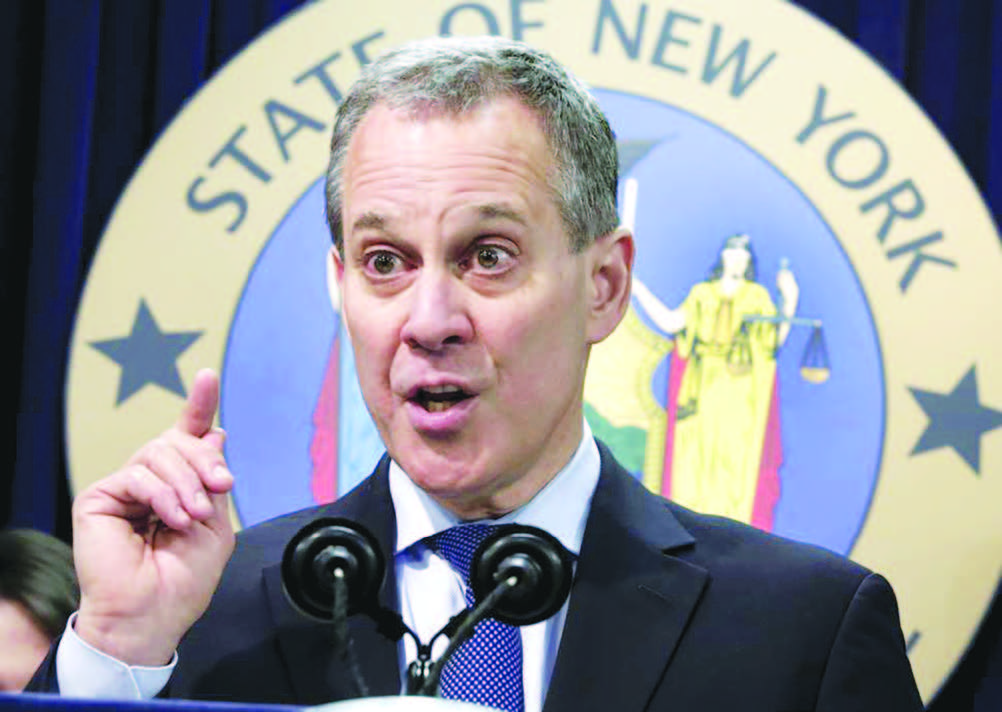
New York State Attorney General launches new law enforcement to crack down on violent heroin and Opioid traffickers
Schneiderman’s “S.U.R.G.E” Initiative brings together AG’s Organized Crime Task Force and Local and State Law Enforcement to target violent gangs
ALBANY, NY (TIP): Responding to the heroin epidemic’s rising death toll in New York’s suburban and upstate communities, Attorney General Eric T. Schneiderman announced, April 28, the launch of the Suburban and Upstate Response to the Growing Epidemic (“S.U.R.G.E.”) Initiative, a new law enforcement effort spearheaded by the Attorney General’s Organized Crime Task Force that aims to disrupt New York’s widening heroin and opioid distribution networks. Specifically, the S.U.R.G.E Initiative will target gangs and individuals who deal heroin and opioids and commit acts of violence in suburban and upstate communities across New York State. To carry out this mission, the OAG’s Organized Crime Task Force, which has partnered with all levels law enforcement to arrest more than 750 individuals in metro areas across the state since 2010, will work closely with federal, state, and local law enforcement to investigate, arrest, and prosecute those criminals who target suburban and upstate areas.
On Thursday, AG Schneiderman and Syracuse Police Chief Frank Fowler announced the first successful takedown under the SURGE Initiative, arresting and indicting 52 people in Operation Bricktown, a multipronged investigation that dealt a major blow to one of Syracuse’s most violent drug dealing street gangs.
“By the Numbers: The Growing Drug Epidemic in New York,” an April 2017 report published by the Rockefeller Institute of Government, found that New York-like most the country-is experiencing a rise in drug-related deaths. According to the report, 14,173 people died from drugs in New York State between 2010 and 2015. In contrast, 9,754 people suffered drug-related deaths in the preceding six years (2004-2009). In 2015 alone, 3,009 New Yorkers died from drug overdoses or from chronic drug abuse-a 71 percent increase from 2010.
While the steady increase of drug-related deaths has been felt across the state, suburban and upstate communities have been hit particularly hard. In New York City, drug-related deaths increased by 45 percent since 2010. Comparatively, drug-related deaths increased by 84 percent in 17 counties outside of New York City (for which there is complete federal data). For example, in Onondaga County, the drug-related death rate increased by 145 percent from 8.8 per 100,000 people in 2010 to 21.6 in 2015.
“The S.U.R.G.E Initiative will bring our state’s most effective law enforcement resources to bear in the fight against New York’s growing opioid and heroin epidemic,” said Attorney General Schneiderman. “I am proud that my Organized Crime Task Force has partnered with state and local enforcement to bring over 750 accused drug and gun dealers to justice since 2010. By directing resources to the communities that need our help the most, we can help curb some the heroin epidemic’s most devastating consequences for New Yorkers. With overdose deaths on the rise and federal funding for drug prevention on the chopping block, the S.U.R.G.E Initiative will be an important part of my office’s multipronged approach to fighting the expansive and violent heroin and opioid distribution networks across New York State.”
Since 2010, Attorney General Schneiderman has launched a multi-pronged strategy to tackle New York’s constantly evolving heroin and opioid epidemic. Some of the Attorney General’s most significant drug addiction and treatment achievements on behalf of New Yorkers include:
Obtaining settlements with major domestic and global health insurers including Cigna, Anthem, and Empire BlueCross BlueShield (BCBS), which insures over 4 million New Yorkers, to remove barriers to life-saving treatment for opioid use disorder. The agreement put an end to the insurers’ policy of requiring prior authorization for medication-assisted treatment (“MAT”), which can lead to significant delays for patients seeking relief from addiction.
Creating the Internet System for Tracking Over- Prescribing Act (“I-STOP), a series of enhancements to New York’s prescription drug monitoring program that provided doctors with patient’s up-to-date controlled substance prescription history and established a safe disposal program providing a place for New Yorkers to get rid of expired and unneeded drugs-thus reducing the likelihood of stolen and forged prescriptions being used to obtain controlled substances from pharmacies. I-STOP also reduced “doctor shopping,” a practice in which an individual attempt to obtain the same or similar prescriptions from multiple physicians, by 90% since 2014.
Launching the Community Overdose Prevention (“COP”) program, a life-saving initiative that enabled state and local law-enforcement officers in the state of New York to carry naloxone, the extremely effective heroin antidote that can instantly reverse the effects of an opioid overdose. Since the program’s implementation in April 2014, more than 100 overdoses were reversed using kits provided by the COP program, which distributed over 27,000 kits across the state.
Obtaining an agreement with Amphastar Pharmaceuticals, Inc. to cut and cap the price of naloxone for all agencies in New York State, reducing the price of naloxone by nearly 20 percent.
Enforcing Mental Health Parity Laws to reach agreements with five insurance companies, Cigna, MVP Health Care, EmblemHealth, Excellus, and ValueOptions, requiring the companies to provide notice of a new appeal right to members whose requests for inpatient substance use disorder rehabilitation and eating disorder residential treatment were denied from 2011 through 2014. The estimated value of Excellus’s denial of these individuals’ requests alone totaled $9 million.
Successfully prosecuting more than ten licensed prescribers including operators of “pill mills” and other unlawful practices form crimes related to improper opioid prescriptions.
“Combatting the heroin and opioid epidemic remains one of my top priorities and through key partnerships with law enforcement officials and other organizations we can help turn the tide and save lives,” Suffolk County Executive Steve Bellone said. “I commend Attorney General Schneiderman on this bold initiative and support his efforts to eradicate those who are exploiting others and tearing families apart.”
AG’s initiative has been widely welcomed by politicians and officials across the State.





More clueless and visionless waste of tax payers dollars form the ag who thought istop would solve everything .lol